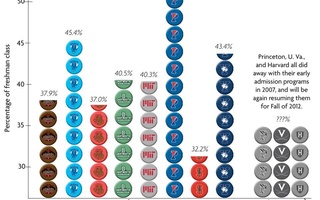Following Harvard’s announcement last week that its early action admissions program would return next fall, undergraduates—except for seniors—at the College seemed to react with a collective shrug, never having an opportunity to apply early to Harvard themselves.
But members of the senior class—the last class that was able to apply to Harvard College under early action—tended to celebrate the program’s return, often arguing that it made the college admission process less stressful.
After Virginia Ng ’11 was accepted to Harvard, she submitted applications to only five of the original 10 schools to which she had planned on applying. Mallika Khandelwal ’11 submitted no other applications.
Ng said that she saw both advantages and disadvantages in the early action program, saying that her high school had provided her with the resources necessary to apply to Harvard early.
“Boston Latin was very special,” she said.
In contrast, Ng mentors a student at a different public school in Boston who met his guidance counselor for the first time during September of his senior year of high school.
“If you haven’t met your guidance counselor until September and have to take the SAT and apply by November, it becomes a big rush,” she said. “It is a disadvantage for people with fewer resources and are of lower socioeconomic status.”
Harvard eliminated the program starting with the Class of 2012, expressing concern that early action unfairly disadvantaged students from lower socioeconomic backgrounds.
Members of the freshman, sophomore, and junior classes expressed varying degrees of disinterest in the return of early action.
“You apply early, you apply regular, it’s the same,” said Gavin D. Pascarella ’13.
Other students felt that the absence of early action removed pressure to finish applications in November.
Douglas M. Bright ’13 said he would not have applied early, even if he had the opportunity.
He cited the desire to perfect his applications to top-tier schools as a reason to apply during the regular cycle.
“I only applied early to what, I guess, would be the safety schools that I had on my list,” he said.
Other students saw early action as a way for applicants to convince the admission committee that a particular school was his or her top choice.
“I think [early action] will only be a good thing. I think you will get a more passionate student body,” said Jordan A. Feyko ’14.
Bryan Cortez ’13 said he thought the Class of 2016 would be more competitive as a result of the change, making the student body stronger overall.
“If you have a more competitive class, you have a more excellent class,” he said.
Read more in News
Richardson Named IOP Spring Visiting FellowRecommended Articles
-
UPDATE: Harvard Announces Return of Early Action Admissions ProgramHarvard announced today that its non-binding early action admissions program will return this fall for the Class of 2016.
-
 After Four Year Hiatus, Early Action Admissions Policy To Return to Harvard College This Fall
After Four Year Hiatus, Early Action Admissions Policy To Return to Harvard College This Fall -
(Early) Action Speaks Louder than WordsIf the reinstitution of early action is, in fact, a sincere effort to open the admissions process to a more talented, socioeconomically diverse pool of applicants, then the College’s decision is justified.
-
Using Early ActionSo far so good for a return to the old way of admissions. Harvard College recently announced that it has received 4,245 applications in its first early action application cycle since 2006.
-
Progress in Early ActionIt’s clear enough that we’d all be better off if America’s top universities dropped the system altogether.
-
Make the Best of Early ActionHarvard should continue to strive to improve outreach strategies and scope of students reached in order to prevent early action from disproportionately advantaging those with more resources.













